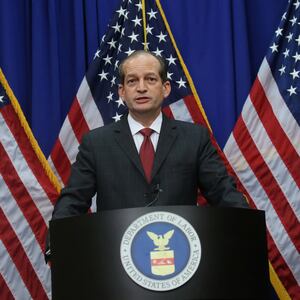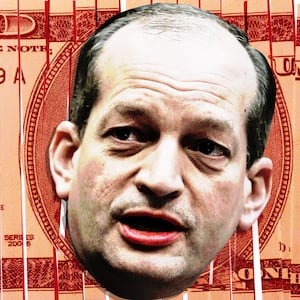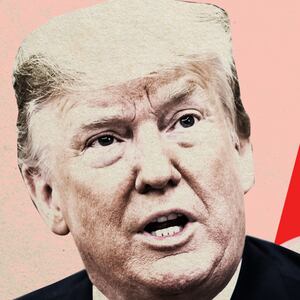Alex Acosta took the podium Wednesday to try to put to rest a controversial plea deal he reached with accused child-sex trafficker Jeffrey Epstein when Acosta was the U.S. attorney in the Southern District of Florida in 2007. Much of what Acosta said sounded somewhat reasonable at first blush: Prosecutors do have a great deal of discretion in charging and resolving cases, so assessing the strength of a case against a defendant, whether he is likely to be convicted, weighed against the possibility of a dangerous defendant walking free, are legitimate and important prosecutorial considerations. But they simply don’t hold up here to explain what Acosta did.
When Acosta’s statements are put up against the facts of this case, they are revealed as the self-serving and often nonsensical excuses of someone who utterly failed to do what he swore to do as U.S. attorney: uphold justice. Congress should now hold a hearing at which Acosta testifies under oath about these matters, so that the victims and all Americans can get answers about why Acosta gave Jeffrey Epstein special treatment.
First and foremost, Acosta claimed that he gave Epstein the now-infamous slap-on-the-wrist non-prosecution deal because state prosecutors in Florida had charged Epstein with a single count of prostitution that would have resulted in no jail time. Acosta claimed that he “wanted to help them [Epstein’s victims], that is why we intervened, and that’s what the prosecutors of my office did…. They insisted that he go to jail and put the world on notice that he was and is a sexual predator."
On its face, that sounds appropriate; Acosta is saying that federal prosecutors stepped in to ensure an outcome that state authorities had failed to reach on their own. But in reality, there was absolutely nothing about Florida’s state prosecution that would have prevented federal authorities from pursuing a full-throttle investigation of Epstein’s crimes—which clearly rose to the level of federal sex trafficking—and aggressively charging that conduct, regardless of what the state did. Neither double jeopardy law nor DOJ policy would have prevented that.
Indeed, during our many years as prosecutors, we were involved in numerous cases in which a state jurisdiction resolved a case unsatisfactorily and we then brought further, more serious charges in federal court. In some cases, there are additional approvals prosecutors have to secure from DOJ when charging a defendant federally after he has faced similar charges in state court. But it is unfathomable that federal sex trafficking charges would not have been approved in this case notwithstanding a Florida state prosecution (indeed, as we know, such charges have now been brought by federal prosecutors in the Southern District of New York), and, in any case, it seems quite clear that Acosta’s office did not even attempt to seek that approval. So while Acosta may want to be seen as the white knight riding in to rescue Epstein’s victims by ensuring a slightly less-bad result than the state of Florida would have given Epstein (even assuming that’s true), that claim rings absolutely hollow.
Another of Acosta’s main themes at the press conference was, the sweetheart deal isn’t my fault because, well, times have changed. “Today’s world treats victims very, very differently,” he said. “Today’s world does not allow some of the victim-shaming that could have taken place at trial.” This is an insulting excuse, concocted after-the-fact to conceal Acosta’s shameful performance as U.S. attorney in this matter.
It is true that societal norms and perceptions about rape and sexual assault victims have changed over the decades, and that more recently the #MeToo Movement has had a role in encouraging victims to speak out about their experiences with abuse. But Acosta greatly exaggerates when he claims that trying a case like this in 2007 would have been significantly more challenging than it would be today.
We were all federal prosecutors in 2007 when this non-prosecution agreement was negotiated. No federal prosecutor or agent we worked with would have ever backed away from a sexual exploitation case involving minors because of the possibility of Acosta’s so-called “victim shaming.” It was 2007, not 1958. Child exploitation and child pornography were believed to be just as abhorrent then as they are now. In all relevant ways, the case would have been charged, tried, and decided exactly the same in 2007 as it would be today.
Moreover, the case against Epstein is, and always was, a compelling one. Acosta stood before reporters and cameras today and claimed that to go to trial would have been “rolling the dice,” as if convicting Epstein of federal charges would have been a matter of sheer chance, making the “sure thing” of two misdemeanor convictions a preferable outcome. Trials do involve an element of risk, of course, but in a case this strong, the risk was minimal. This was another way in which Acosta’s statements today, while having some surface appeal, were actually misleading.
At the time Acosta decided not to prosecute Epstein, dozens of victims already had come forward to tell the FBI what Epstein did to them. Their statements were corroborated by other evidence discovered by investigators. The prosecutors and FBI agents amassed enough evidence to support a 82-page prosecution memo and a 53-page draft indictment for a federal sex trafficking case, according to Doe v. United States, 08-80736-Civ-Marra (SDFL 2019), a civil case in which two of Epstein’s victims are suing because they were not informed of the secret non-prosecution agreement that Epstein received from Acosta’s office.
Acosta also dodged responsibility for his illegal failure to confer with Epstein’s victims about the possibility of a non-prosecution agreement. When asked about this, and about the fact that victims were never told of the agreement until after the fact, Acosta tried to claim that the prosecutors had a “difficult decision” to make when crafting the agreement. The agreement had a provision by which Epstein agreed to pay for legal representation for the identified victims and also consented to restitution. According to Acosta, the agreement was hidden from the victims because if the victims knew about it (and knew that they might be receiving restitution), their credibility as witnesses would be somehow compromised if the deal ultimately fell through and the victims had to testify at a trial.
This explanation is incredible in numerous respects. First, even if Acosta somehow thought he was acting in the best interests of the case by not telling the victims about a resolution, as Judge Marra noted when he found Acosta and his office broke the law in his decision in the Doe case, prosecutors were obligated by both law and ethics to tell the victims that Epstein was not going to face federal charges and that the federal investigation was going to be closed.
Second, Acosta and his team were apparently worried that informing the victims of this “deal,” which would provide the opportunity for them to receive restitution from Epstein, would somehow compromise the victims’ testimony if plea negotiations fell apart and the government had to take Epstein to trial. To be sure, preserving the integrity of a victim’s testimony is a legitimate concern of prosecutors. This is why prosecutors disclose to the defense any promises or representations made to victims or witnesses. For example, if funds were given to a victim in order to relocate them for safety concerns, prosecutors notify the defense so they can potentially use that information to cross-examine that witness at trial, perhaps arguing that the witness was now beholden to the government. Prosecutors are keenly aware of these defense arguments—which in our experience are rarely successful—and they are prepared to explain to a jury why a witness’s testimony is not compromised. This is a problem prosecutors face every day and is certainly not an excuse for hiding this agreement from the victims.
Acosta was also evasive (at best) when it came to a much-cited off-site breakfast meeting he had with one of Epstein’s lawyers (Jay Lefkowitz). When asked by a reporter whether he met with one of Epstein’s lawyers at a hotel, Acosta provided an astonishing explanation. On the substance of the meeting, Acosta stated that it was unimportant, because it happened after the negotiations over the non-prosecution agreement were completed. Acosta’s version of events is flatly contradicted by the facts as found by Judge Marra, which makes clear that the negotiations over whether and when the victims would be informed of the secret non-prosecution deal—which the Epstein team viewed as “critical”—were in full swing on Oct.12, 2007, the date of the breakfast meeting.
Judge Marra also points out that a letter from defense counsel memorializing the meeting stated that, contrary to Acosta’s claim that nothing of substance happened during the meeting, Acosta actually “assured [defense counsel] that [the] Office would not … contact any of the identified individuals,” i.e., the victims. This was a major victory for Epstein, of course, keeping the victims in the dark, and it appears that Acosta agreed to it by himself, away from the office, over a shared meal.
When asked about the appropriateness of the meeting’s location, Acosta was incredulous, stating that because the meeting was early, “you don’t open an office at 7:00 in the morning to just have a meeting. You have it over breakfast.” Not in our experience. What you do, actually, is tell your adversary that you’re available to meet at the U.S. Attorney’s Office during regular business hours. Then there would be no suggestion of impropriety.
Defense lawyers can be aggressive—their job is to get the best deal they can for their client. The job of prosecutors representing the United States is to uphold the law and vindicate the victims despite these tactics. Alex Acosta failed at this fundamental responsibility of his position. The question, to which we still don’t know the answer despite Wednesday’s hour-long press conference, is why? Acosta’s attempts to defend the sweetheart deal he gave Jeffrey Epstein, while containing some surface appeal, fell flat upon examination of the facts. This matter should be investigated by Congress, with the full record before them, so that Acosta can be questioned under oath and Epstein’s victims and the American people can learn the truth.











